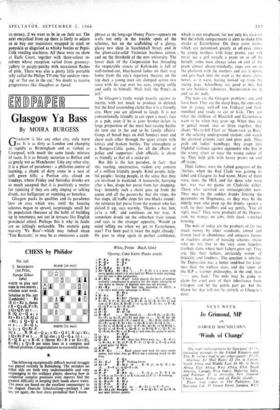Glasgow Ya Bass
ENDRAPEN
By MOIRA BURGESS
GLASGOW is like any other city, only more so. It is as dirty as London and changing 'as rapidly as Birmingham and as violent as Glasgow packs its qualities and its paradoxes 'into an area which was, until the housing 'achernes began to sprawl, surprisingly small for its population (because of the habit of building • up in tenements, not out in terraces like English • provincial cities). Perhaps this is why its faults • are so joltingly noticeable. The esoteric gang war-cry `Ya Bass'—which may indeed mean 'You Bastards,' or may be as innocuous a catch- phrase as the long-ago Honey Pears—appears on walls not only in the trouble spots of the schemes, but on the scaffolding of a glossy, glassy new shop in Sauchiehall Street, and in the plum-cake-solid Victorian business centre, and on the threshold of the new university. The lower deck of the Corporation bus threading the respectable streets of Kelvinside is full of well-turned-out, blue-haired ladies on their way home from the city's repertory theatre; on the top deck a young man sits slumped across two seats with his cap over his eyes, singing softly and sadly to himself, 'Hail, hail, the Pope's in jail.'
So Glasgow's faults weigh heavily against its merits, with not much to produce in defence but the final resounding cliché that it is a friendly city. Here you are allowed to laugh. It is not conventionally friendly to cut open a man's face in a pub, even if he is your brother-in-law (a large proportion of the most hair-raising battles do turn out in the end to be family affairs). Gangs of bored boys on dull Sundays meet and chase each other through the quiet streets with knives and broken bottles. The atmosphere at a Rangers-Celtic game, for all the efforts of police and supporters' club officials, is about as friendly as that of a snake-pit.
But this is the last paradox, in fact: that this roaring, unattractive, violent city consists of a million friendly people. Kind people, help- ful people: loving people, in the sense that they are involved in mankind. A housewife, hurrying after a bus, drops her purse from her shopping- bag : instantly such a shout goes up from the queue and all the passers-by that she stops, the bus stops, all traffic stops for two blocks round: she retrieves her purse from the woman who has picked it up, says warmly, 'Thanks a lot, hen, ye're a toff,' and continues on her way. A somnolent drunk on the suburban train rouses and says to the stranger. opposite, 'Would ye mind telling me when we get to Easterhouse, mac? I've been past it twice the night already.' He goes to sleep again in perfect confidence, which is not misplaced, for not only his vis-à-vis but the .whole compartment is alert to shake him awake at Easterhouse. On these same trains. which are patronised greatly at off-peak times by young mothers with huge prams, you will never see a girl wrestle a pram on or off by herself; some man always takes an end of the pram almost absent-mindedly, steps out on to the platform with the mothers and sets it down, and gets back into the train as the doors close. never, as it were, having looked up from the racing page. Schoolboys are good at this, but so are builders' labourers. Businessmen do it, and so do nods.
The nods are the Glasgow problem: are, and have been. They are the sharp boys, the ones who run in gangs, well-off (on Fridays) and foul- mouthed and ready to cut or kick. They are what the children of Blackhill and Easterhouse want to be when they grow up. When they are in genial mood, two or three together, they chant, 'Ma-ry-hill Fleet' or 'Sham-rock ya Bass,' in the echoing underground stations and watch the alarmed citizens start and grow pale. They grab old ladies' handbags; they erupt into frightful violence against opponents who live in the wrong street or wear the wrong colour of tie. They help girls with heavy prams on and off trains.
Their fathers were the fabled gangsters of the 'thirties, when the .Red Clyde was gaining its label and Glasgow its bad name. Many of them were, later, the HU, and for those who were not, war was no picnic on Clydeside either. Those who survived are unrecognisable now. They may be the sodden drunks littering the pavements on Hogmanay, or they may be the elderly men who prop up the drunks against a wall, tie their mufflers and say gently, You all right, mac?" They were products of the Depres- sion, no money, no jobs, little food, wretched housing.
The neds of today are the products of far too much money by older standards, tinned and frozen food in abundance, and adequate houses in trackless deserts of housing schemes (those who do not live in the very same hopeless Gorbals slums where their fathers grew up). They are, like their fathers, intricately woven of brutality and kindness. The question is whether the Depression was a better seed-bed for kind- ness than the welfare state, and the tenets of the I LP a warmer philosophy, in the end, than you, Jack.' The neds may be going to claim the cruel part of their inheritance from Glasgow and let the gentle part go; but the blame for that will not lie entirely at Glasgow's door.






























 Previous page
Previous page